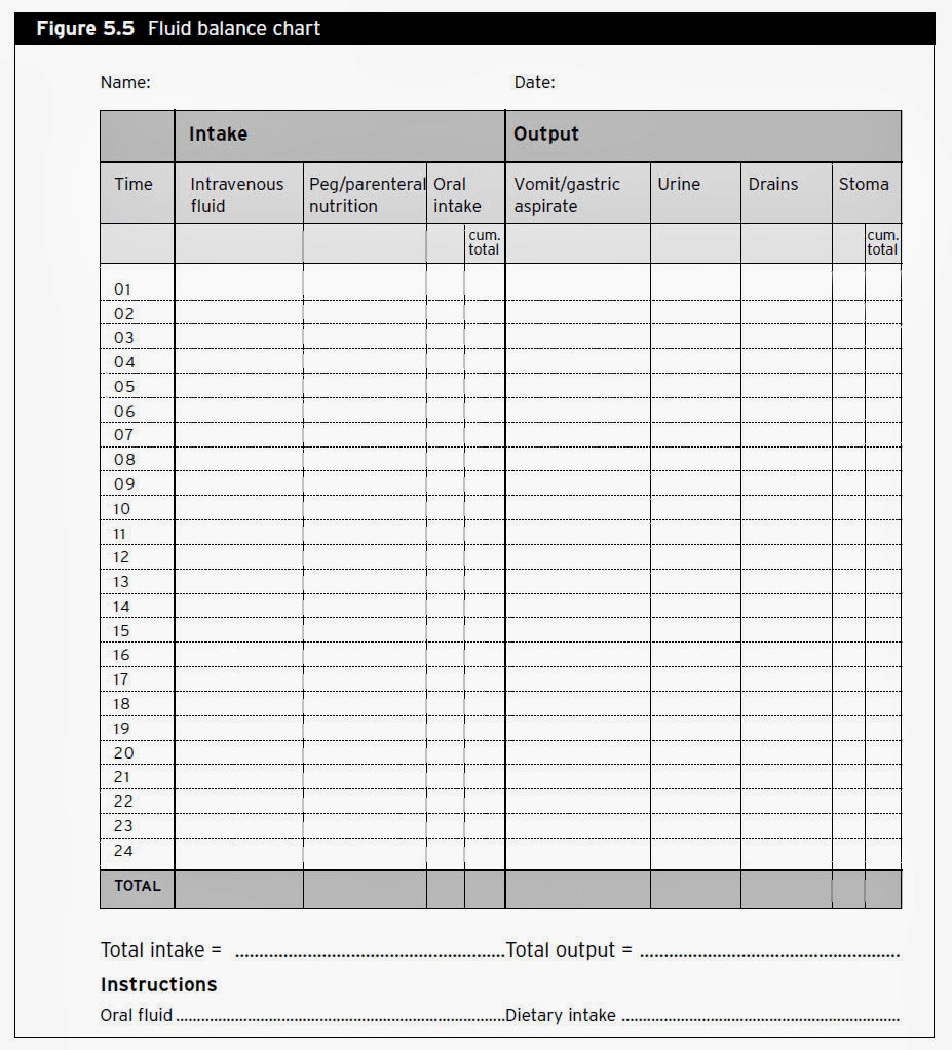Nursing Assessment of Fluid and Electrolyte Imbalances
-
Chronic diseases
-
Acute conditions
-
Medications
-
Age:
-
Very old or very young
-
-
Inability to access food and fluids
-
Skin
-
Mucus membranes
-
Eyes
-
Fontanels (infants)
-
Cardiovascular system
-
Respiratory system
-
Neurologic
-
Daily weights:
-
At the same time each day
-
Wearing the same or similar clothing
-
On the same scale
-
-
Vital signs
-
Fluid intake/output
-
Oral fluids
-
Foods that are or become liquid at room temperature
-
Tube feedings
-
Parenteral feedings
-
IV medications
-
Catheter or tube irrigation
-
Urinary output
-
Vomitus and liquid feces
-
Tube drainage
-
Wound and Fistula Drainage
Physical Assessment:
Clinical Measurements:
Intake to be Recorded:
Output to be Recorded:

Nursing Test Bank
Test Bank #1: RN Pharmacology Exams
Test Bank #2: RN Medical-Surgical Exams
Test Bank #3: RN Fundamentals Exams
Test Bank #4: RN Maternal-Newborn Exams
Test Bank #5: RN Anatomy and Physiology Exams
Test Bank #6: RN Obstetrics and Pediatrics Exams
Test Bank #7: RN Fluid and Electrolytes Exams
Test Bank #9: RN Adult Health
Test Bank #10: RN Dosage Calculation
Test Bank #11: RN Community Health Exams
Test Bank #12: RN Psychology Exams
Test Bank #13: RN Nursing Care Of Children
Test Bank #14: RN Foundations of Nursing Exams
Naxlex Comprehensive Predictor Exams
Exam #1: RN Comprehensive predictor 2023 proctored exam
Exam #2: Ati rn vati comprehensive predictor proctored exam
Exam #3: Ati Rn Comprehensive Predictor Proctored Exam 2023
Exam #4: Rn Comprehensive Predictor 2023 Proctored Exam - St. Joseph
Exam #5: RN Comprehensive Predictor Proctored Exam (National U CA San Diego)
Exam #6: Ati rn comprehensive predictor 2023 retake proctored exam
Exam #7: RN Hesi Exit Proctored Exam
Exam #8: Hesi RN Exit proctored exam
Exam #9: Hesi rn exit proctored exam
Exam #10: Hesi Rn compass exit B proctored exam
Questions on Nursing Assessment of Fluid and Electrolyte Imbalances
Correct Answer is A
Explanation
<p>Increasing dietary intake of potassium is not helpful for a client who has hypernatremia. Potassium is another electrolyte that plays a role in fluid balance and nerve function, but it is not affected by hypernatremia. In fact, increasing potassium intake may worsen the condition by causing further dehydration or hyperkalemia (high potassium levels)</p>
Correct Answer is A
Explanation
<p>Having a headache and dizziness is a sign of cerebral dehydration and a negative outcome of IV fluid therapy. Headache and dizziness are common symptoms of dehydration that result from reduced blood flow to the brain and increased osmolality of the blood. When IV fluids are administered, they improve the cerebral perfusion and osmotic balance and relieve the headache and dizziness.</p>
Correct Answer is ["A","B","C","E"]
Explanation
<p>Elevating the head of the bed is a fourth action that the nurse should take because it improves respiratory function and reduces pulmonary congestion. The nurse should elevate the head of the bed to at least 30 degrees or more, depending on the client's comfort and tolerance. The nurse should also monitor the client's oxygen saturation, breath sounds, and dyspnea.</p>
<p>A client who has chronic kidney disease should not use salt substitutes instead of table salt because they often contain potassium chloride, which can also increase the potassium level in the blood and cause hyperkalemia. Salt substitutes are not recommended for clients who have kidney disease or
<p>Crackles in the lungs are not a sign of fluid volume deficit, but rather a sign of fluid volume excess or pulmonary edema. Crackles are abnormal lung sounds that indicate fluid accumulation in the alveoli or air sacs of the lungs. Fluid volume deficit does not cause fluid accumulation in the lung
Search Here
More on Nursing
- Mobility, Immobility and Positioning
- Critical Thinking and Nursing Process
- Oxygen Therapy and Respiratory Care (Oxygenation and Perfusion)
- Care of Patients with Chronic Illnesses
- Patient Assessment and Documentation
- End-of-life Care and Palliative Care
- Vital Signs Measurement
- Safety Fall
- Skin integrity and Basic wound care and dressing changes
- Nursing Ethics and Professionalism
Free Nursing Study Materials
Access to all study guides and practice questions for nursing for free.
- Free Nursing Study Trials
- Free Nursing Video tutorials
- Free Nursing Practice Tests
- Free Exam and Study Modes
- Free Nursing Revision Quizlets
